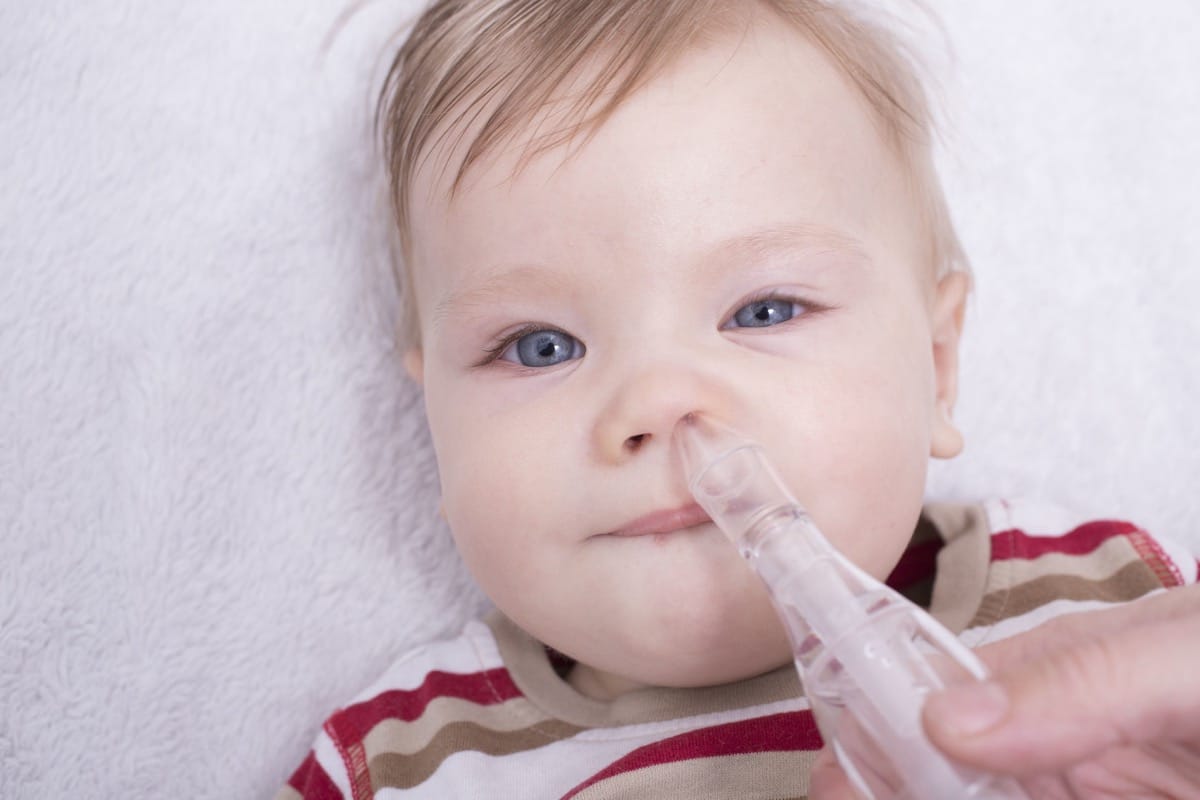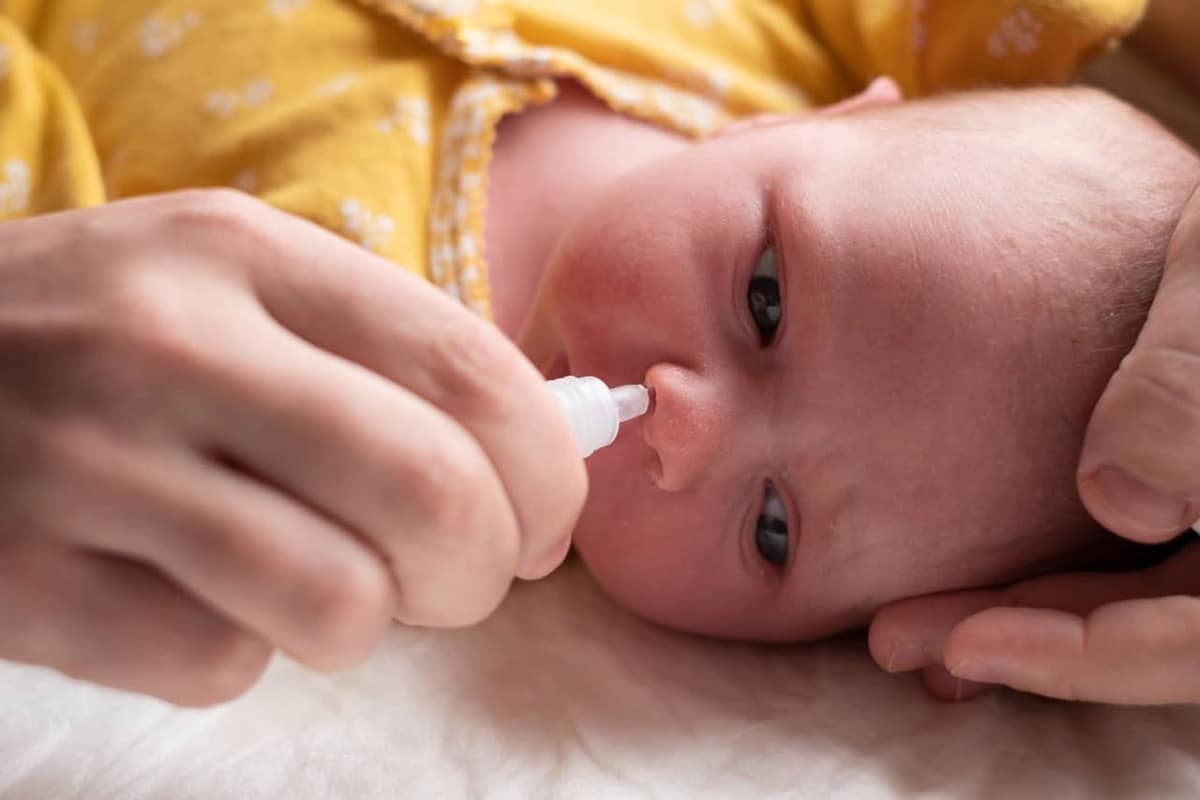If you have a one-month-old baby, you probably have noticed that when snot appears, it can be a real problem. We are going to talk to you about what to do when your little one has runny nose since they are annoying and it is more than likely that your baby will feel distressed for this reason.
Why do they happen and what to do about it? Next we will talk about all this because we know that although snot is something common in our lives, when babies are the ones who suffer it, It is a great concern for parents.
Why do 1-month-old babies have snot?
It is normal for 1-month-old babies to have a runny nose, as their respiratory system is still very sensitive and they are adjusting to the new environment outside the womb. Mucus is the body's natural response to irritants and germs that may be present in the air. Some of the common causes are:
- Respiratory infections. Common colds and viral infections can cause nasal congestion and runny nose in babies. These colds are usually mild, but it is important to be vigilant to avoid complications.
- Allergic reaction. Babies can be sensitive to certain allergens in the environment, such as dust, mites, or allergens from pet hair. These allergies can cause nasal congestion and mucus production.
- Changes in temperature Sudden changes in temperature or exposure to very dry environments can irritate the baby's airways, leading to the production of mucus.
- Irritating in the environment. The presence of tobacco smoke, strong chemicals, or strong perfumes in the baby's environment can cause nasal congestion and runny nose.

How to prevent and relieve runny nose in 1-month-old babies
Although we cannot completely prevent one-month-old babies from having a runny nose, there are some measures we can take to prevent and alleviate it. Whether your baby has runny nose right now or if you want to prevent her from having it (although this is more difficult), do not miss what we explain below:
- Maintain good hygiene. Wash your hands frequently before touching the baby and prevent sick people from doing so. This will help reduce exposure to germs that can cause colds and runny noses.
- Ensures a clean environment. Make sure the baby's room is clean and free of dust. Vacuum regularly, wash bedding regularly, and avoid using harsh chemicals that can irritate the respiratory tract.
- Avoid tobacco smoke. Secondhand smoke can be harmful to the baby and can irritate the airways, leading to mucus production. Keep your baby away from smoke and avoid smoking around him.
- Control the temperature and humidity. Keep the baby's room at an adequate temperature and with adequate humidity levels. An environment that is too hot or too dry can irritate the airways and contribute to the production of mucus. Use a humidifier to keep the humidity in the room and make sure the temperature is comfortable.
- Breastfeed your baby. Breast milk contains antibodies that help strengthen the baby's immune system. Exclusive breastfeeding during the first months of life can help prevent respiratory infections and reduce mucus production.
- Elevates the baby's head when sleeping. Place a pillow under the mattress or slightly raise the head of the crib to help drain mucus and make it easier for the baby to breathe at night.
These are some preventive tips, but below we are going to explain what you can do in the event that your baby already has runny nose.
Useful tips to relieve runny nose in 1-month-old babies
In addition to taking preventive measures, there are also some tips that you can use to ease the discomfort when you feel that you have a lot of runny nose:
- Gently clean the nose. Use a nasal aspirator or bulb syringe to gently remove mucus from the baby's nose. Be sure to follow the manufacturer's instructions and don't apply too much pressure to avoid damaging her delicate nose.
- Hydration. It is important to take into account that your baby is well hydrated. If she is breastfeeding, offer the breast frequently. If he is bottle-fed, check with your pediatrician about how much extra fluid he may need.
- Steam shower. Steam baths can help loosen mucus and make it easier for the baby to breathe. Fill the bath with hot water and sit in the bath with your baby for a few minutes. Be careful not to expose the baby to hot water directly.
- Gentle massages. Gently massage baby's chest and back to help relieve congestion and promote mucus drainage. Use gentle circular motions with your fingertips.
- Consult with the pediatrician. If the runny nose persists for more than a week, if the baby shows signs of discomfort, or if you have any concerns, it's important to see your pediatrician. The doctor will be able to assess the situation and recommend the best treatment for your baby.

When to seek medical attention
Although it is true that runny nose is normal in people at any age, it is true that 1-month-old babies are more vulnerable, so you have to keep this in mind to know when to seek immediate medical attention.
In principle, they are not a cause for serious concern, although there are situations that should help you quickly decide whether to seek medical attention as soon as possible. Memorize the alarm signals that we are going to discuss below so that if they happen to your baby, you can immediately seek medical help. Take note:
- Respiratory distress If your baby shows signs of difficulty breathing, such as rapid or labored breathing, chest retractions (when the spaces between the ribs cave in with each breath), or bluish lips and fingernails, you should seek medical attention immediately.
- High fever. If your baby has a fever of 38°C or higher, especially if it is accompanied by other symptoms such as lethargy, extreme irritability or refusal to eat, you should consult your pediatrician.
- persistent cough If your baby's cough persists for more than a week and is getting worse rather than better, you may want to see your doctor to rule out any complications.
- Changes in eating pattern. If your baby exhibits a sudden change in his feeding pattern, such as refusing the breast or bottle, it's important to see your pediatrician to rule out any underlying problems.
- Ringing in the chest. If your baby has wheezing in the chest when he is breathing then go to the pediatrician as soon as possible.
- He cries a lot when he coughs. If you cough and start crying uncontrollably, it probably hurts to do so. It will be necessary for you to go to the pediatrician as soon as possible to have an evaluation done as soon as possible.
Remember that it is always better to be safe and seek medical attention when you have questions or concerns about your baby's health. Never stay in doubt or wait "for it to go away on its own". If you notice that your baby is not well, go to the doctor without thinking twice.

Emotional care during runny nose episodes
Runny episodes in one-month-old babies can be uncomfortable and distressing for both baby and parents. It is important to pay attention to emotional care during this time. Here are some tips to help you maintain a positive environment and provide emotional support for your baby. These tips will also help you feel better and not feel like you are losing control of your emotions:
- Comfort and closeness. Keep your baby close to you and provide comfort through physical contact, such as hugs and gentle touches. Skin-to-skin contact can be especially comforting.
- Calm and patience. Stay calm and be patient during runny bouts. Babies can sense parental anxiety, so it's important to convey a calm, collected energy.
- Game and distraction. It provides moments of play and distraction to distract your baby from the discomfort of snot. Play with him, sing songs or use toys to get his attention.
- Seek support and help. Seek support and understanding in your environment, be it from your partner, family or friends. Sharing your worries and experiences with people close to you can ease the emotional stress that can arise during these times.
Runny nose in 1-month-old babies is common and, in most cases, is a normal response of the body to irritants and germs. Everything we have explained to you above will help you have enough tools to stay calm and also to know exactly when you should seek help from a medical professional if necessary. Snots are very annoying, but from now on you can have them much more controlled.